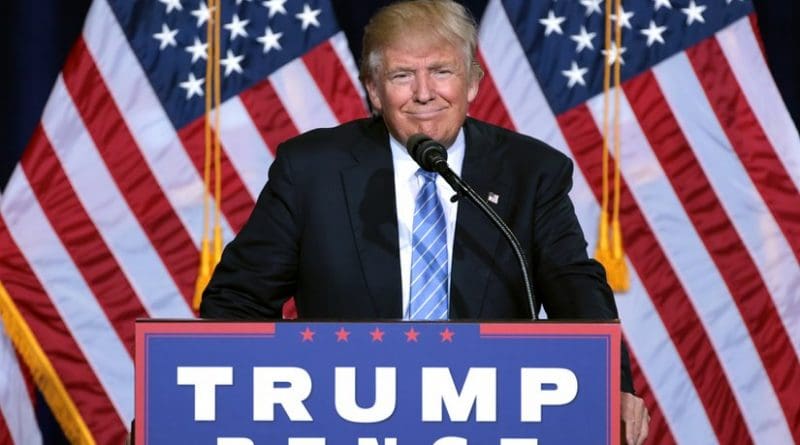India’s Challenges Lies In Handling Spillovers Of Trump Policies Elsewhere – Analysis
By Observer Research Foundation
By Abhijnan Rej
When the history of the 21st century is written, 8 November 2016 will be marked as a day when the worst nightmare of liberal internationalists came true with the election of the 45th President of the United States: Donald John Trump. The road from here to a global free-for-all is not far. All that would take is for Trump to carry out a small fraction of his foreign policy promises — if one can indeed call fragmentary, contradictory, stream-of-consciousness statements as such.
What President Trump means for India has already been dissected to the point where adding anything new becomes impossible, on either side of the ledger — Trump as “positive” or “negative” when it comes to India. And as umpteen commentators have already noted, the broad bipartisan support for India is something no American President can overturn overnight. Having said that the challenge for India does not lie in dealing with Trump’s India-specific policies. It lies with firefighting contingencies and spillovers from his administration’s policies elsewhere.
Key among them would be his handling of China, Russia, and the Middle East. If President Trump was also to withdraw longstanding security support for Europe and Japan, India will be inevitably drawn in, as opportunities or threats.
The main challenge emanating from Trump lies elsewhere, at a more fundamental level, in his desire to do two contradictory things at once. On one hand, his has been a stance of neo-isolationism, a nod to the American isolationists of the late 1930s, between the two world wars. On the other hand, he wants to maintain American leadership in the international system which — as Americans since President Woodrow Wilson have understood — often imply the deployment of diplomacy and force for causes far removed from the shores of the Atlantic or the Pacific.
This contradiction will become vivid in Trump’s Middle East strategy. Throughout his campaign, Trump has — often in fairly blunt terms — indicated his desire to tame the Islamic State. In his own words, he would like to “knock the hell out of them.” But as Bush 43 found out to his own peril after the extremely-ill-advised invasion of Iraq in 2003, superior firepower and “shock-and-awe” tactics only goes so far. The real challenge starts when the bombing ends, and when the only thing that prevents an ancient society from falling apart are American boots on the ground. If Trump’s Middle East strategy is ‘shoot-and-scoot,’ the coming anarchy in the Middle East will make Iraq and Syria look like suburban Maryland, in comparison.
Trump’s advisors — which include people slated for cabinet positions — know this well, often from direct professional experience. For example, retired US army lieutenant general Michael Flynn is rumoured to be appointed either as Secretary of Defense (for which he may be ineligible by law, barring a congressional waiver) or National Security Advisor in the Trump administration. Flynn served as the head of intelligence in the joint special operations command during the Afghanistan and Iraq campaigns and is a well-known (and respected) scholar-practitioner of counter terrorism and intelligence.
Confidantes like Flynn will definitely alert Trump to the possibility should the United States embark on a vigorous campaign to annihilate the Islamic State and other assorted Sunni extremists, then the country ought to engage in the region on a long haul. In which case, Trump simply becomes Bush 43, albeit with a foul mouth and a worse attitude.
The alternative is that the US retrenches by erecting Fortress America, thereby ceding tremendous strategic space to the Russians. This may be acceptable to Trump, given his bonhomie with Vladimir Putin, and indeed strategically desirable based on a realpolitikal calculation. “Let Russia sort out the Middle East while we sit back and toast our good fortune,” Trump could think. Such a position, by definition, reduces American importance in the region and therefore deals a grave blow to America’s aspirations to global leadership.
Of course — and we must remember, as Niall Fergusson has written umpteen number of times, we are in the year of the unthinkable — the United States under Trump could decide to collaborate with the Russians in going after the Islamic State. This would mean Assad stays in power, given the Russian inflexibility in this matter. But worse still, a US-Russia entente may have to accommodate the growing Russia-China axis.
Trump’s China position is well known and the most visible leitmotif of his proto-foreign-policy. Typical of Trump’s inflammatory style, he once said: “We can’t continue to allow China to rape our country.” Suppose Trump gets serious about China – triggering a trade war between the two countries in the process. Beijing will most definitely try to convince Moscow to disengage with Washington and it is extremely unlikely that Russia would prefer the US over China.
This brings us to a fairly interesting geopolitical game that could be played in the near future: Would Russia see gaining enough from collaborating with the US in the Middle East to jettison China? Or will it try to step back and watch two of its historical adversaries — the US and China — squabble?
A new era of geopolitics is upon us.
This article originally appeared in the First Post.

